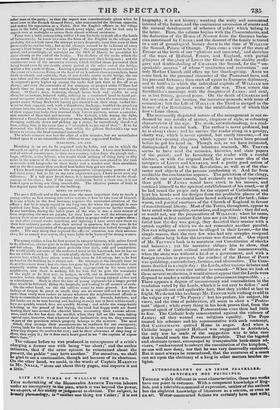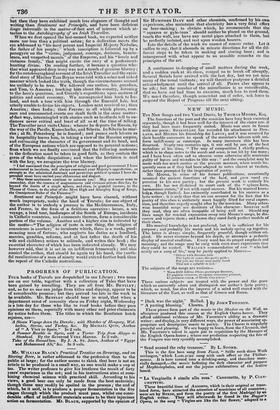AUTOBIOGRAPHY OF AN IRISH TRAVELLER. SENTIMENT NOT PRINCIPLE.
THOUGH widely different in most characteristics, these two works have one point in common. With a competent knowledge of liSh, and a tolerahhe command of expression, neither of the authors has the slightest knowledge of literature as a sciences or even as an art.. Worse-constructed actions we certainly ba:se get witki but then they have exhibited much less elegance of thought and writing than Sentiment not Principle, and have been deficient longo intervallo in the matter-of-fact sort of interest which at- taches to the Autobiography of an Irish Traveller. When we first opened the last-named book, we expected neither More nor less than a political satire; for a dedication meets the eye addressed to "his most potent and Imperial Majesty Nicholas, the father of his people;" which inscription is followed up by a panegyric on the "virtue, judgment, courage, decision, benevo- lence, and unspotted morals" of the Emperor, and his "lovely and virtuous family," that might excite the envy of a preferment- hunting divine. On reading further, it became a question whe- ther what appeared deep irony was not a touch of genuine blarney ; for the autobiographical account of the Irish Traveller and the episo- dical story of Misther Tom Bryan were told with a sober and naked manner which looked like truth, though the circumstances seemed too unlikely to be true. We followed our author, his guardian, and Tom, to America ; tracking him about the country, listening to the hero's questions, and Guardy's expositions upon matters of politics and social economy. We accompanied him back to Ire- land, and took a tour with him through the Emerald Isle, but utterly unable to divine his objects. London next received us ; then America; then India; then France; in all which places, com- mon and unconnected events are dealt forth in the same matter- of-fact way, intermingled with stories such as landlords tell to au- diences never critical and least of all so at the time of telling. The Traveller next visits China; whence he departs for Russia, by the way of the Pacific, Kamschatka, and Siberia. In Siberia lie mar- ries; at St. Petersburg he is feasted ; and passes such leisure as its hospitality leaves him, in taking a view of the Russian empire, and estimating the character of its government and its head, and of the European nations which are opposed to its paternal notions; from which we are finally convinced that the following sentences in the dedication must be taken in good faith, as they contain the germ of' the whole disquisition; and when the hortation is read with the key, we recognize the true blarney. " I feel convinced that the principles of religion and good government I have endeavoured to inculcate, will always command your Majesty's approbation, as strongly as the atheistical doctrines and pernicious political systems 1 have de. preened must have excited your abhorrence and disgust.
" May these sentiments continue to animate you! May you never cease to remember, that the renown of magnanimous and virtuous actions flies far, far lie and the limits of a single sphere, and rises, in grateful incense, to the Throne of Grace, to the altar of the Most High and Almighty King of Kings, the Omnipotent Ruler of the Universe!"
Sentiment not Principle might have been classed, without much impropriety, under the head of Travels; for one object of the author is to embody a journey to the Mediterranean, Italy, and France, in the form of a fictitious narrative : hence, a sea voyage, a land tour, landscapes of the South of Europe, incidents in Catholic countries, and comments thereon, form a considerable portion of the volume. Another and a higher aim is indicated by the motto—" The religion of taste is one thing, the religion of conscience is another;" to inculcate which, there is a weak, good- meaning man of fortune, who neglects his duties as a landlord, marries, gambles, reforms, and at last (after the death of his wife and children) retires to solitude, and writes this bcok ; the essential character of which has been indicated already. We may however add, that it is set in an indifferent framework; and also remind the author, that should he again try his hand, the youth- ful recollections of a man of ninety would extend further back than the repeal of the Catholic restrictions.



























 Previous page
Previous page